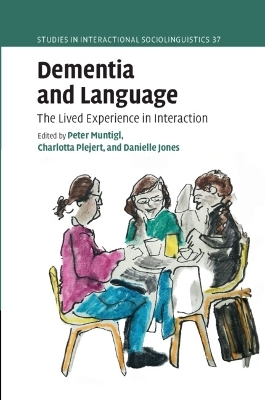
Dementia and Language
Cambridge University Press (Verlag)
978-1-108-42453-0 (ISBN)
Bringing together cutting-edge research from a group of international scholars, this innovative volume examines how people with dementia interact with others in a variety of social contexts, ranging from everyday conversation to clinical settings. Drawing on methods from conversation analysis, it sheds light on how people with dementia accomplish relevant goals in interaction, as well as how changes in an individual's discursive abilities may affect how conversationalists negotiate a world in common and continue to build their social relationships. By exploring interaction, this book breaks new ground in challenging the commonplace assumptions about what constitutes typical or atypical interactions in communication involving people with dementia, and further demonstrates the unique and creative strategies all speakers employ to facilitate better and more collaborative communication. It is essential reading for academic researchers and advanced students across sociolinguistics, interactional linguistics and conversational analysis, as well as health care practitioners.
Peter Muntigl is Adjunct Professor at the Faculty of Education, Simon Fraser University, Canada. His recent publications include Interaction in Psychotherapy (2023, CUP). Charlotta Plejert is Senior Associate Professor at the Department of Biomedical and Clinical Sciences, Linköping University, Sweden. Notable publications include Multilingual Interaction and Dementia (Plejert, Lindholm & Schrauf, 2017, Multilingual Matters). Danielle Jones is Associate Professor at the Centre for Applied Dementia Studies, University of Bradford, UK. She is a medical sociologist with 20 years' experience of using Conversation Analysis to explore communication between people living with dementia, their families, and medical professionals.
Part I. Introduction: 1. Interaction research and dementia Peter Muntigl, Danielle Jones and Charlotta Plejert; Part II. Dementia and Diagnostics: 2. Good reasons for non-standardisation in the administration of cognitive assessments Danielle Jones, Clare Jackson and Ray Wilkinson; 3. (Dis)alignment at dementia diagnosis: a window into differing expectations, perceptions and agendas in the memory clinic Jemima Dooley and Rose Mccabe; 4. The role of applied conversation analysis to enhance equity in care for people with dementia from minority ethnic groups Charlotta Plejert; Part III. Dementia and Conversational Strategies: 5. Using 'now what' to discursively compensate for frontotemporal dementia-related challenges: a longitudinal case study Lisa Mikesell; 6. Being sociable: a case study of a man with vascular dementia singing in conversation Roy Foster; 7. On the use of tag questions by co-participants of people with dementia: asymmetries of knowledge, power and interactional competence Jacqueline Kindell, John Keady and Ray Wilkinson; 8. Initiating and pursuing a topical agenda with limited communicative resources Anne Marie Dalby Landmark and Jan Svennevig; Part IV. Dementia and Epistemics: 9. Identifying family members in photographs: practical epistemic and deontic challenges for a person with frontotemporal dementia Peter Muntigl, Gerhard Ransmayr and Stephanie Hödl; 10. 'You know this better': interactional challenges for couples living with dementia when the epistemic status regarding shared past events are uncertain Anna Ekström, Elin Nilsson and Ali Reza Majlesi; 11. Maintaining personhood and authority in everyday talk of a family living with dementia Lindsay Lindley; Part V. Communicative Challenges in Everyday Social Life: 12. Language and cognition in conversations with a person with Alzheimer's disease Danielle Jones; 13. Using digital communication support in interaction involving people with dementia– interactional strategies to facilitate participation and engagement Christina Samuelsson; 14. 'It's more than eating, it's a social situation' – video analysis and professional vision in dementia care Camilla Lindholm and Tuula Tykkyläinen; 15. Social quizzes for people living with dementia: how enactment impacts on interaction Joe Webb.
| Erscheinungsdatum | 19.11.2024 |
|---|---|
| Reihe/Serie | Studies in Interactional Sociolinguistics |
| Zusatzinfo | Worked examples or Exercises |
| Verlagsort | Cambridge |
| Sprache | englisch |
| Themenwelt | Geisteswissenschaften ► Sprach- / Literaturwissenschaft ► Sprachwissenschaft |
| Medizin / Pharmazie ► Medizinische Fachgebiete ► Geriatrie | |
| ISBN-10 | 1-108-42453-8 / 1108424538 |
| ISBN-13 | 978-1-108-42453-0 / 9781108424530 |
| Zustand | Neuware |
| Informationen gemäß Produktsicherheitsverordnung (GPSR) | |
| Haben Sie eine Frage zum Produkt? |
aus dem Bereich


